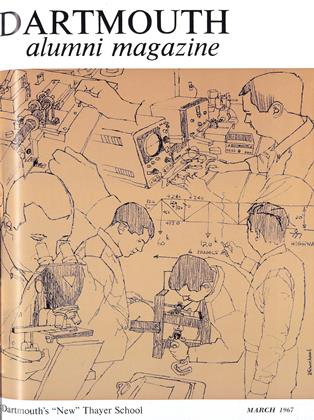WHEN Ph.D. candidate in radiophysics STEVEN F. CLIFFORD applied for admission to Thayer School in 1965, the School didn't offer the Ph.D. degree he sought. A Northeastern University graduate with a B.S. degree in electrical engineering, Steve had heard about new approaches at Thayer and about Dean Myron Tribus and the work going on in Thayer's Radiophysics Laboratory directed by Professor Millett G. Morgan. After a visit to Hanover and interviews with five Thayer faculty members, he was convinced that the Thayer program was what he was after and he enrolled - as a Master of Science candidate.
Soon after his arrival, however, the Ph.D. program was approved, and Steve began preparing for the first comprehensive examinations that would qualify him for the four-year doctorate program. Last December he passed the written comprehensive in mathematics and physics; the oral part of the exam is yet to come.
With his background in electrical engineering and an interest in engineering science, Steve moved easily and happily into the research going on at the Radiophysics Laboratory. As a half-time assistant to the head of his faculty advisory committee, Assistant Professor John Strohbehn, he spent about twenty hours a week his first year on research. His contribution to the research effort resulted in the uncommon opportunity to co-author a paper with his faculty adviser. The paper, "Polarization fluctuations in a turbulent medium," will be published this spring in the Institute of Electronic and Electrical Engineering's Transactions onAntennas and Propagation.
Steve took only two courses a term last year as an assistant, more of them in graduate physics than engineering, and this year (working only a third of his time on research in wave propagation under a National Aeronautics and Space Administration traineeship) he is taking a full schedule of courses in mathematics as well as physics and engineering science. His chief adviser, Professor Strohbehn, is in Moscow working in atmospheric physics, but Steve continues his independent on his thesis project in wave propagation.
A product of a large city university, Steve enjoys the "small, close-knit" character of his studies and research at Thayer's Radiophysics Laboratory. "The chance to do research right away is very unique," he remarked. "It gives you an idea of what you want to take for courses. It gets you involved." He's also impressed by the flexibility allowed in the Ph.D. program.
Father of a first child born in January, Steve hopes to complete Thayer's demanding requirements for the Ph.D. (mastery of physics, mathematical analysis, an area of engineering science - and "original research which makes a significant contribution to knowledge or which produces a technique, device, or system of significant value") in 1969. After that, he looks toward a career in teaching and research in engineering science. It's a long, tough road, but Ph.D. candidate Steve Clifford is enjoying the trip.
 View Full Issue
View Full Issue
More From This Issue
Features
-
 Feature
FeatureTHE COLLEGE OF TOMORROW
April 1962 -
 Cover Story
Cover StoryJake Winebaum '81
March 1993 -
 Feature
FeatureA PORTFOLIO OF THE Dartmouth Cemetery
November 1973 By ADRIAN BOUCHARD -
 Feature
FeatureHow to Win at Dartmouth
Jan/Feb 2006 By CAL NEWPORT ’04 -
 Feature
FeatureNever Say Die or Adversity Foiled the Story of 100 Years of Rowing
April 1957 By CLIFFORD L. JORDAN '45 -
 Feature
FeatureAlumni News
Mar/Apr 2006 By Paul Stone '60







